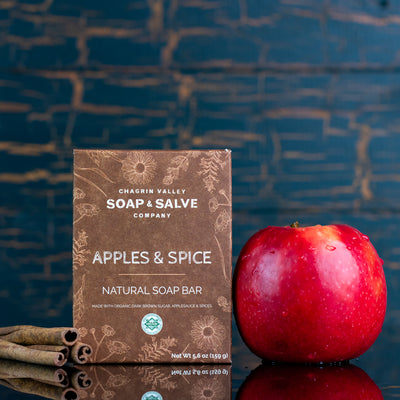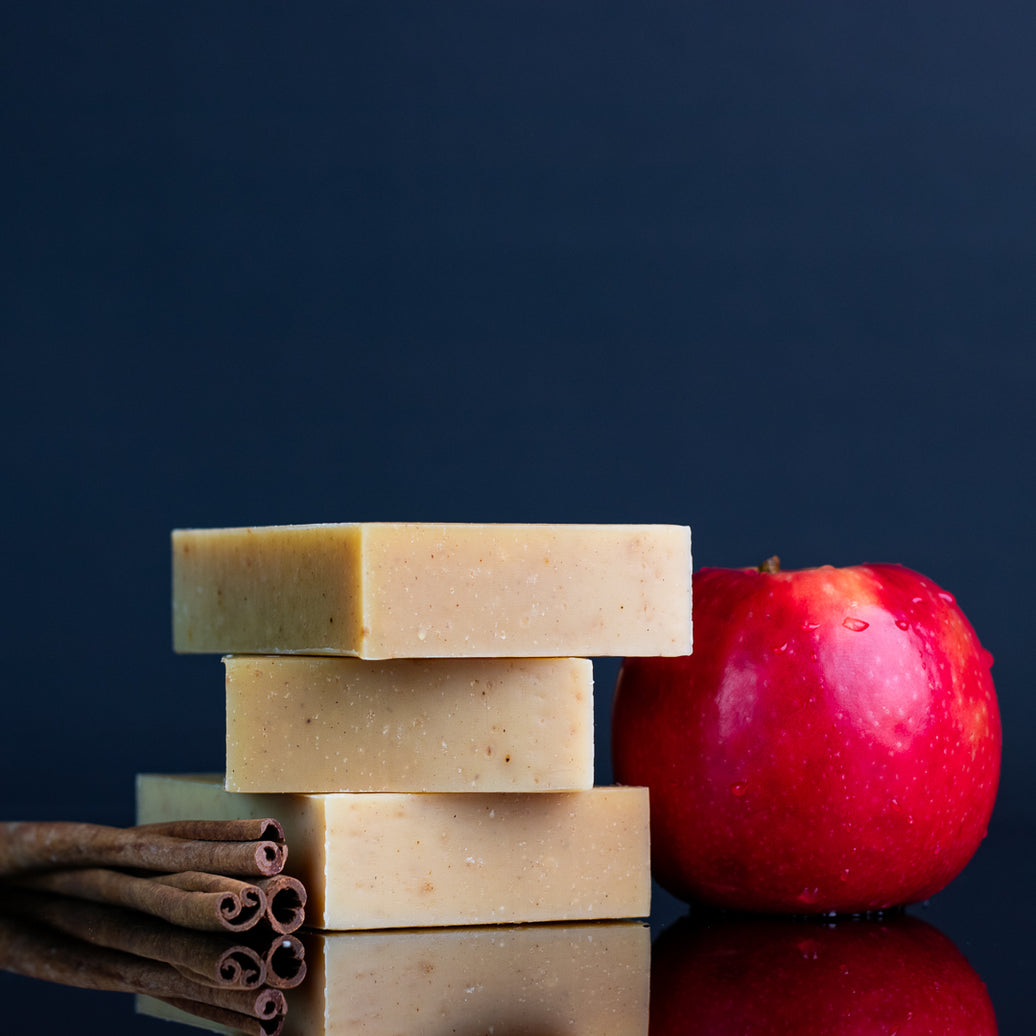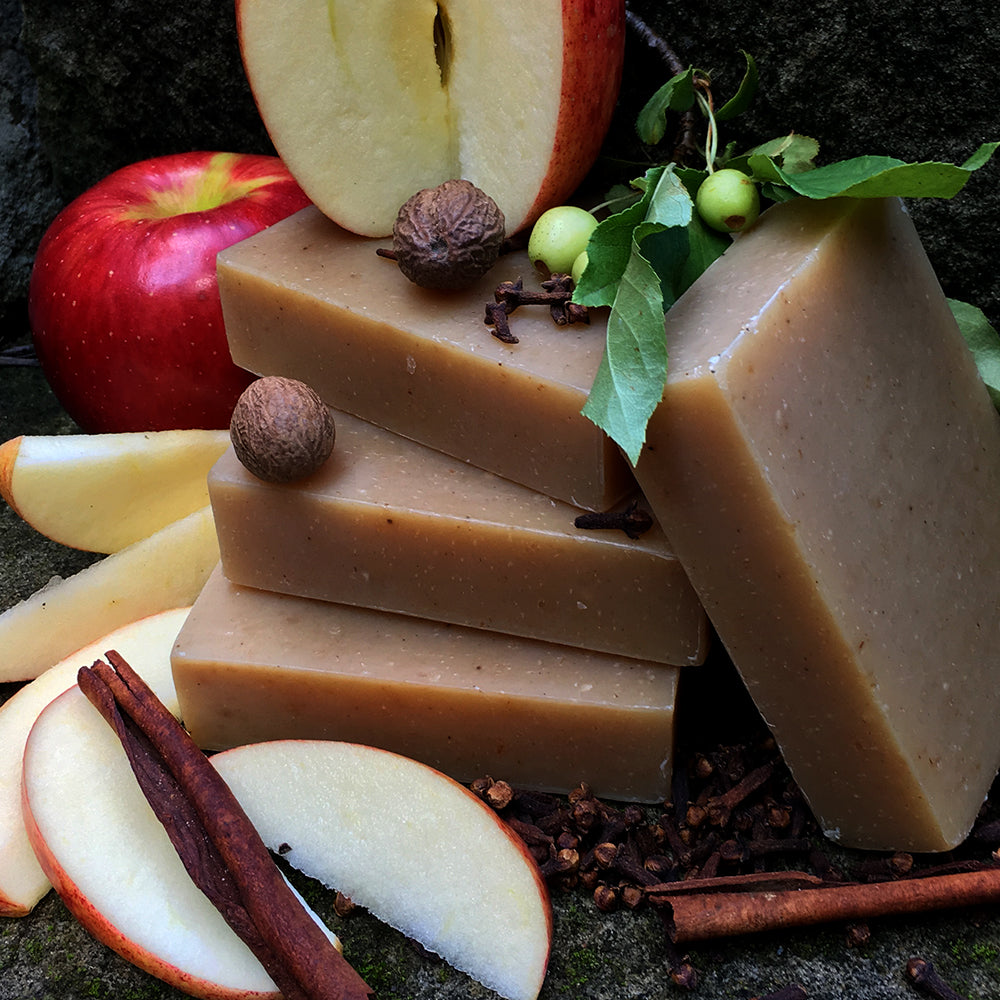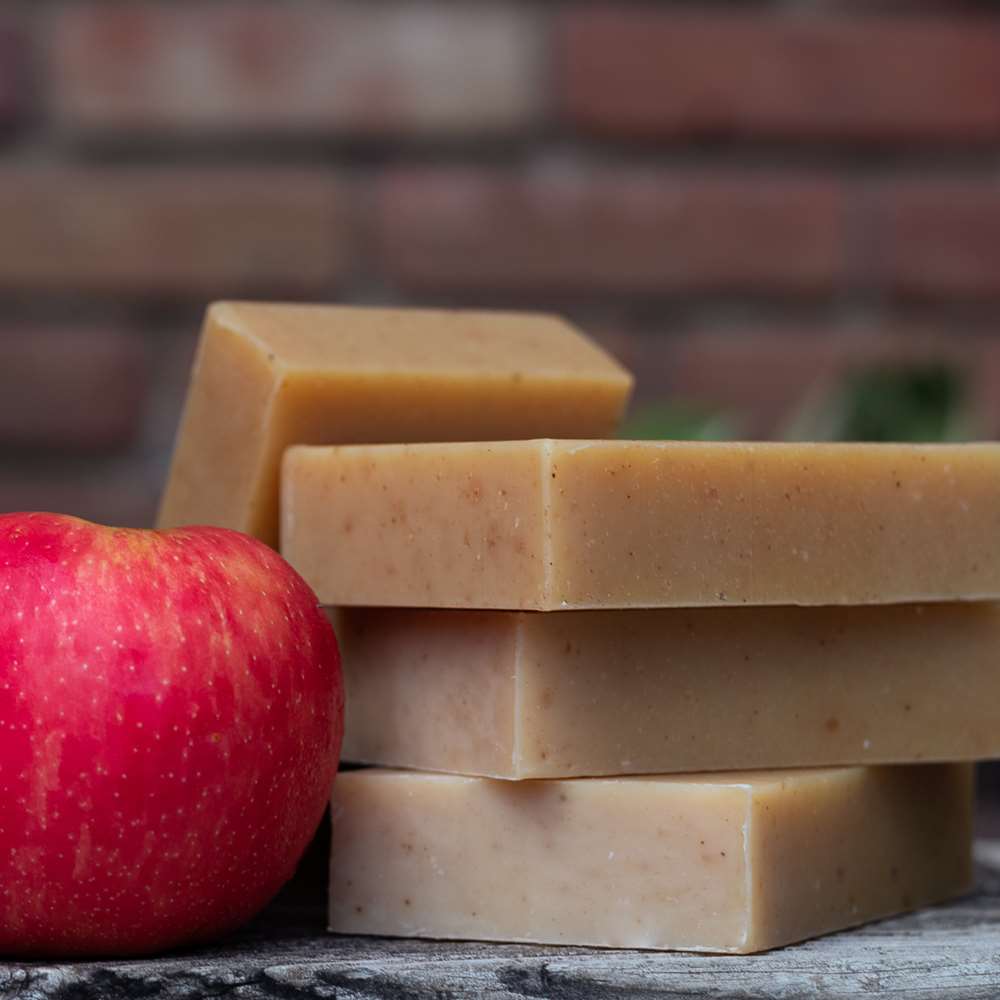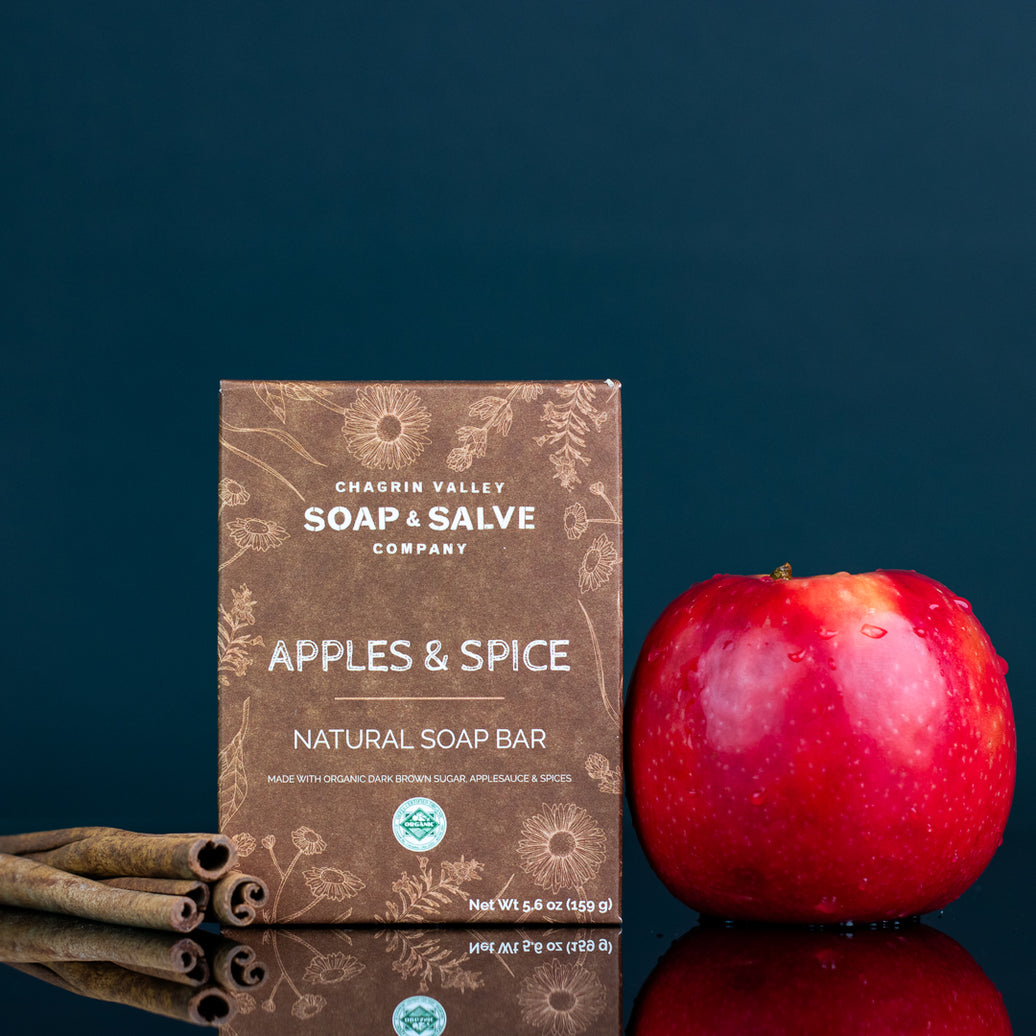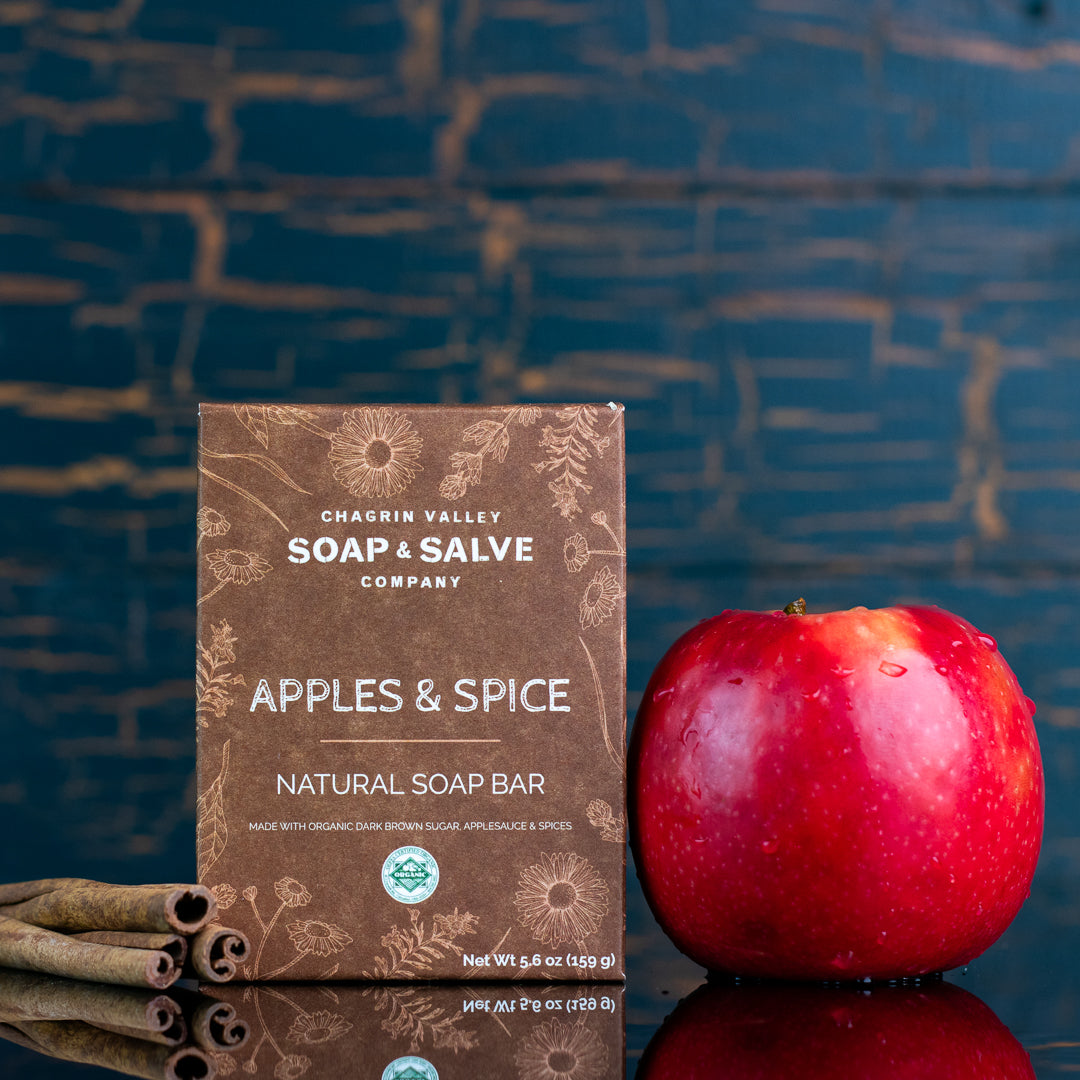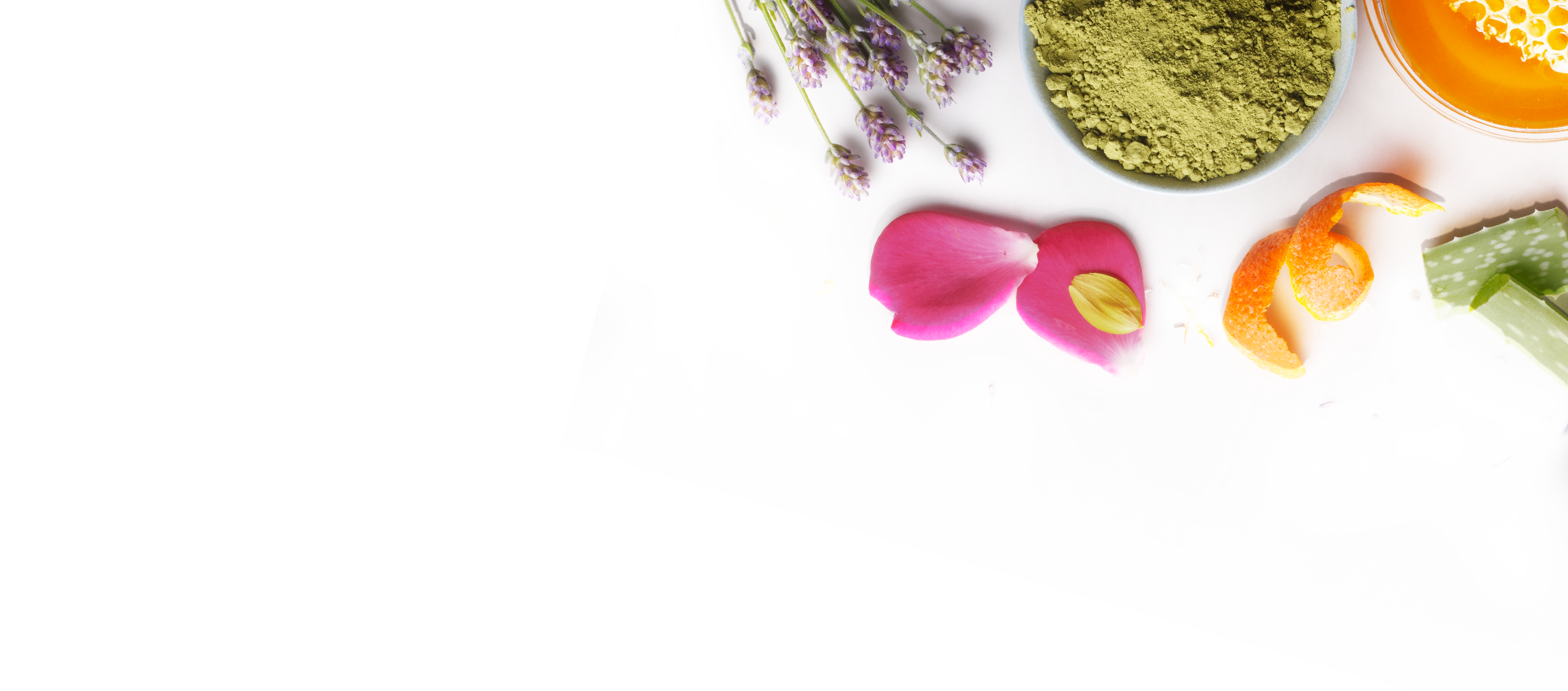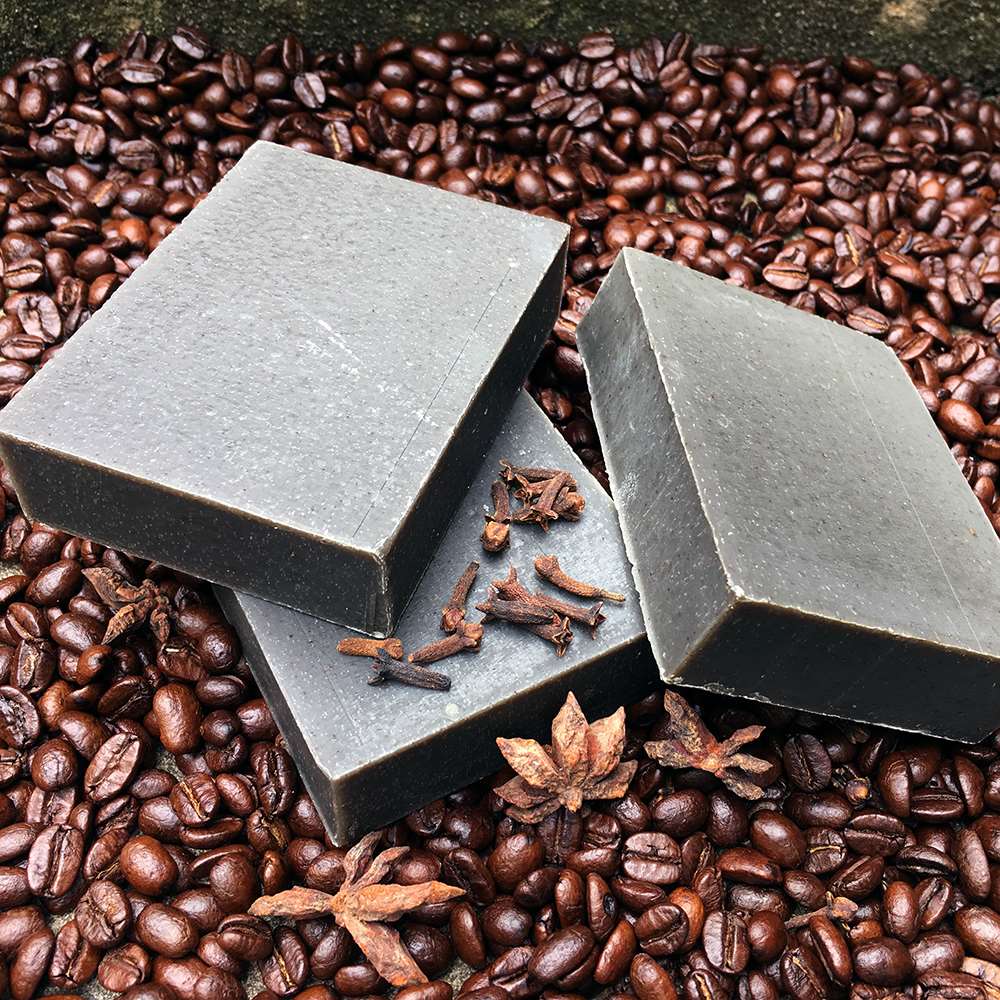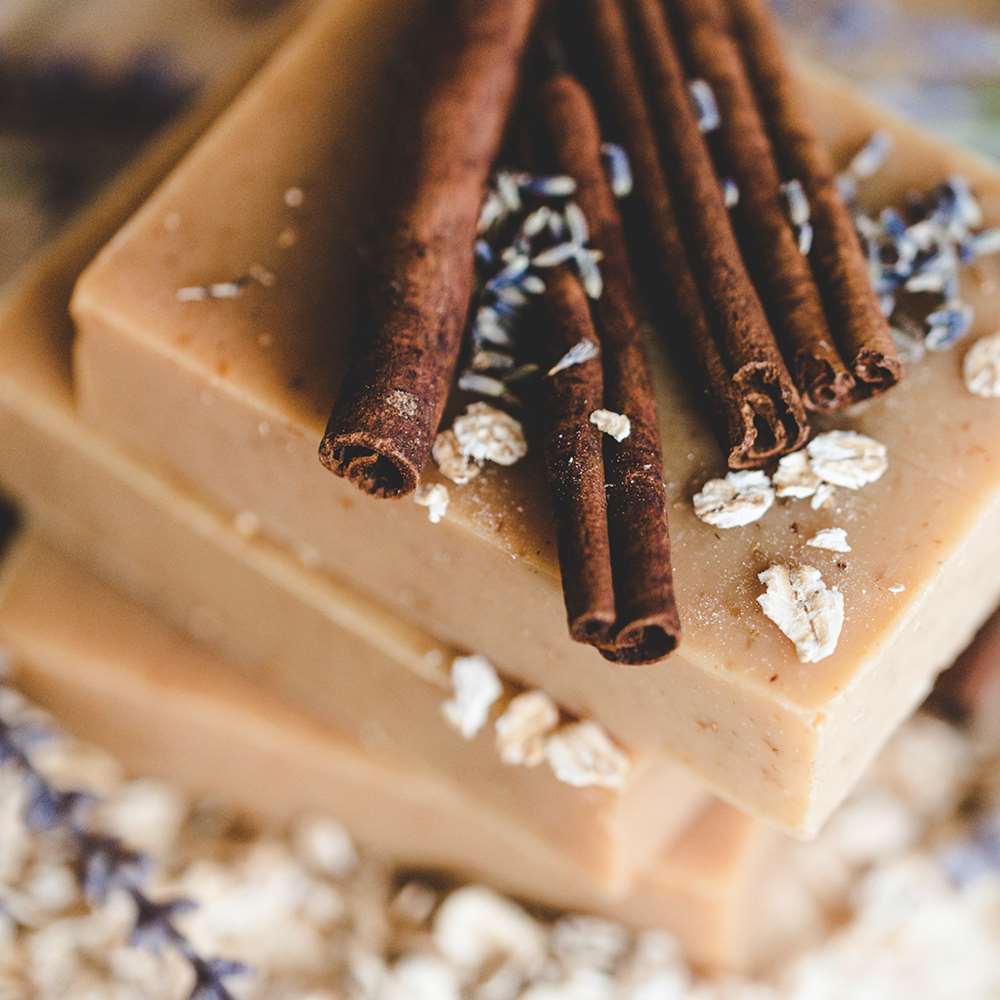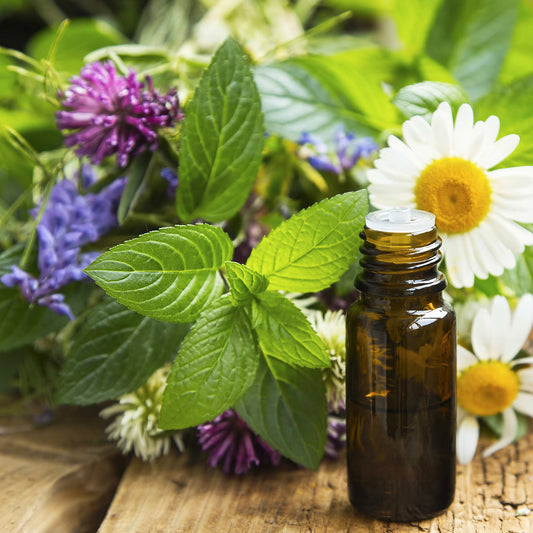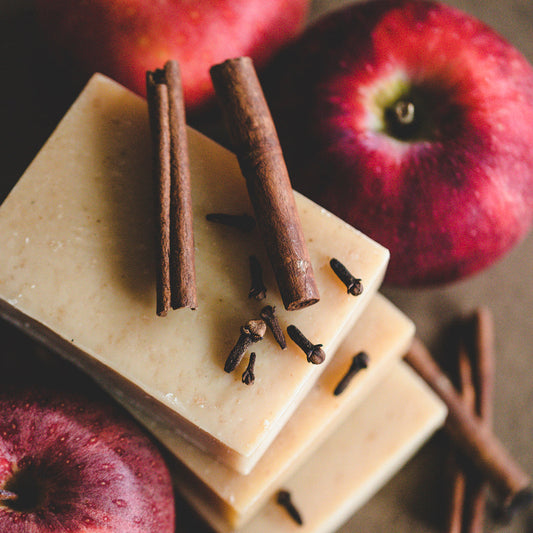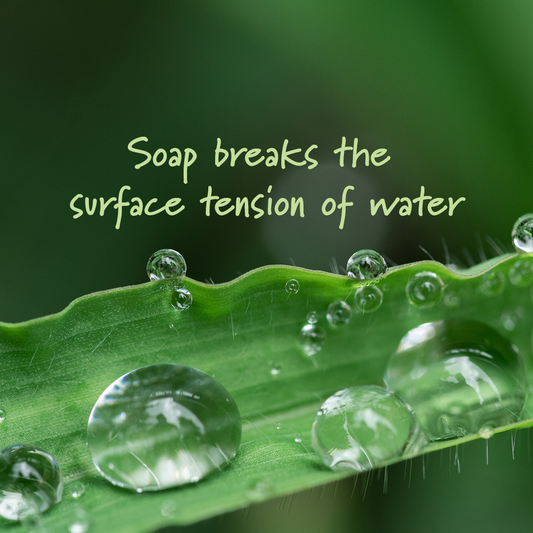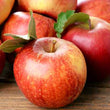
Natural Soap: Apples & Spice
Natural Soap: Apples & Spice
A seasonal favorite made with real organic applesauce, unfiltered apple juice, nourishing plant oils, dark brown sugar, spices, and enriched with moisturizing shea butter to create a scrumptious natural soap. The rich, creamy lather is infused with a warm wonderful essential oil blend reminiscent of spiced cider.
- Out Of Stock






Product Overview
During the hot days of summer I look forward to the cooler crisp days of autumn and nothing says early autumn like apples. I love everything apple season. Apple picking, homemade apple pie, caramel apples, apple fritters, and of course, spiced apple cider. So we are getting a head start with our scrumptious natural Apples & Spice soap that is so yummy, you will wish you could take a bite. But remember it's SOAP!
While the old saying, "an apple a day keeps the doctor away," refers to eating apples, apples boast a bushel of benefits for your face and skin even when used topically.
Jam-packed with nutrition, apples are a great natural skin toner. They help cleanse and tighten enlarged pores and balance sebum production to prevent a greasy complexion.
This seasonal favorite is made with real organic applesauce, unfiltered apple juice and nourishing plant oils, enriched with moisturizing shea butter, and infused with dark brown sugar, a natural humectant.
The ground spices and brown sugar add a bit of texture for exfoliation.
The moisturizing lather is filled with a warm, delicious essential oil blend combined with ground cinnamon, nutmeg, and clove (NO fragrance oils here). As you shower close your eyes and experience the scent of warm spiced cider on a cool autumn day.
We make limited quantities of our seasonal soaps, so once they are sold out, they are gone for the season.
How To Use
What Should I Use With My Natural Soap to Clean My Body?
 The purpose of soap is to combine with oil and dirt on the body, which allows water to wash it away. The method you use to cleanse your skin is really a personal preference. We thought we would share just a few examples.
The purpose of soap is to combine with oil and dirt on the body, which allows water to wash it away. The method you use to cleanse your skin is really a personal preference. We thought we would share just a few examples.
Bar Bathers rub the bar directly on their skin to create a creamy lather. Massaging the velvety lather into your skin before rinsing allows you to experience the best moisturizing properties of the soap. This is definitely the best way to use exfoliating soaps.
Hand Latherers create lather in their clean hands and use the lather to massage and wash the skin. This gentle, mild cleansing method may be good for those with sensitive skin.
 Washcloth Washers use a washcloth to lather up. Washcloths are made out of lots of different textile textures, from soft cotton to agave fibers, and can provide very gentle to intense exfoliation. Be sure washcloths are laundered and dried often.
Washcloth Washers use a washcloth to lather up. Washcloths are made out of lots of different textile textures, from soft cotton to agave fibers, and can provide very gentle to intense exfoliation. Be sure washcloths are laundered and dried often.
Puff Polishers use a mesh puff that works up a foamy, bubbly lather, even with hard water, to wash and gently exfoliate the skin. Poofs make natural soap last longer but can harbor bacteria, so rinse thoroughly after use and replace every few weeks or clean per manufacturer's instructions.
Loofah Latherers love their loofahs that exfoliate and help increase circulation. Whole loofahs can be breeding grounds for bacteria, so be sure they dry out properly after use and replace them every two months. If you would like something less abrasive, check out our Bath & Body Accessories.
Soap Sackers place their soap into a nylon soap bag. The fibers have a smooth texture for gentle cleansing. Soap sacks can be used for whole bars of soap or scraps that would normally be thrown away.
There is a large variety of bathing accessories available. If using any accessory, never share them with others and replace or clean them often.
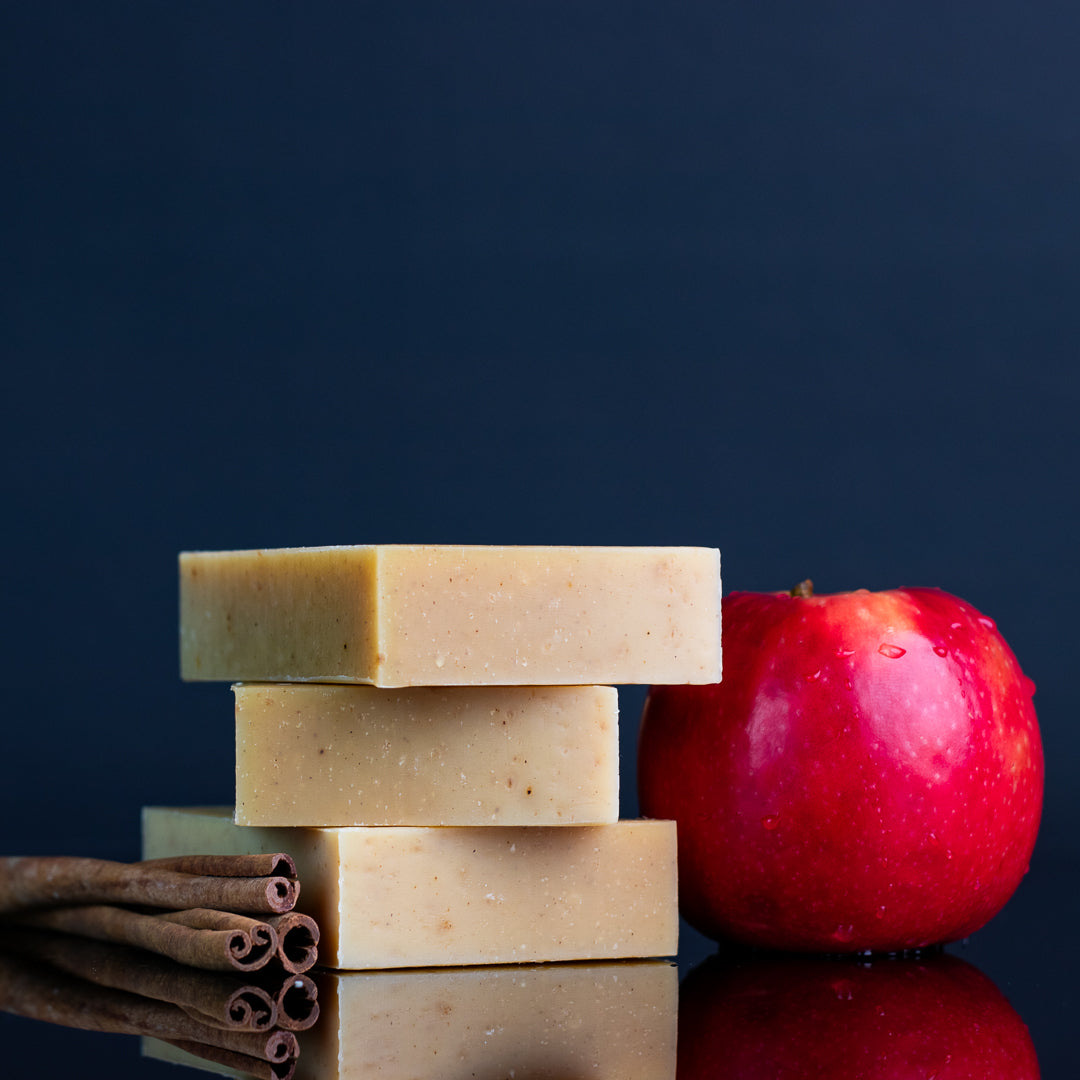
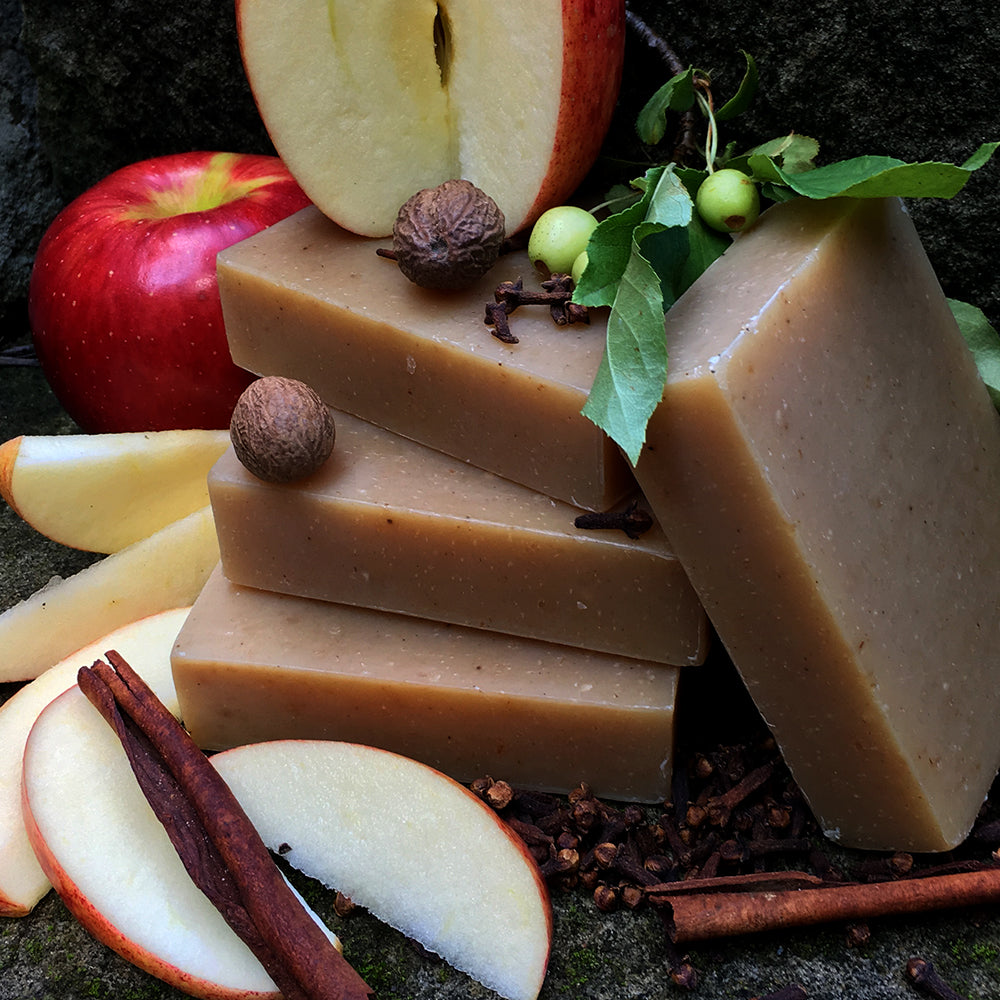
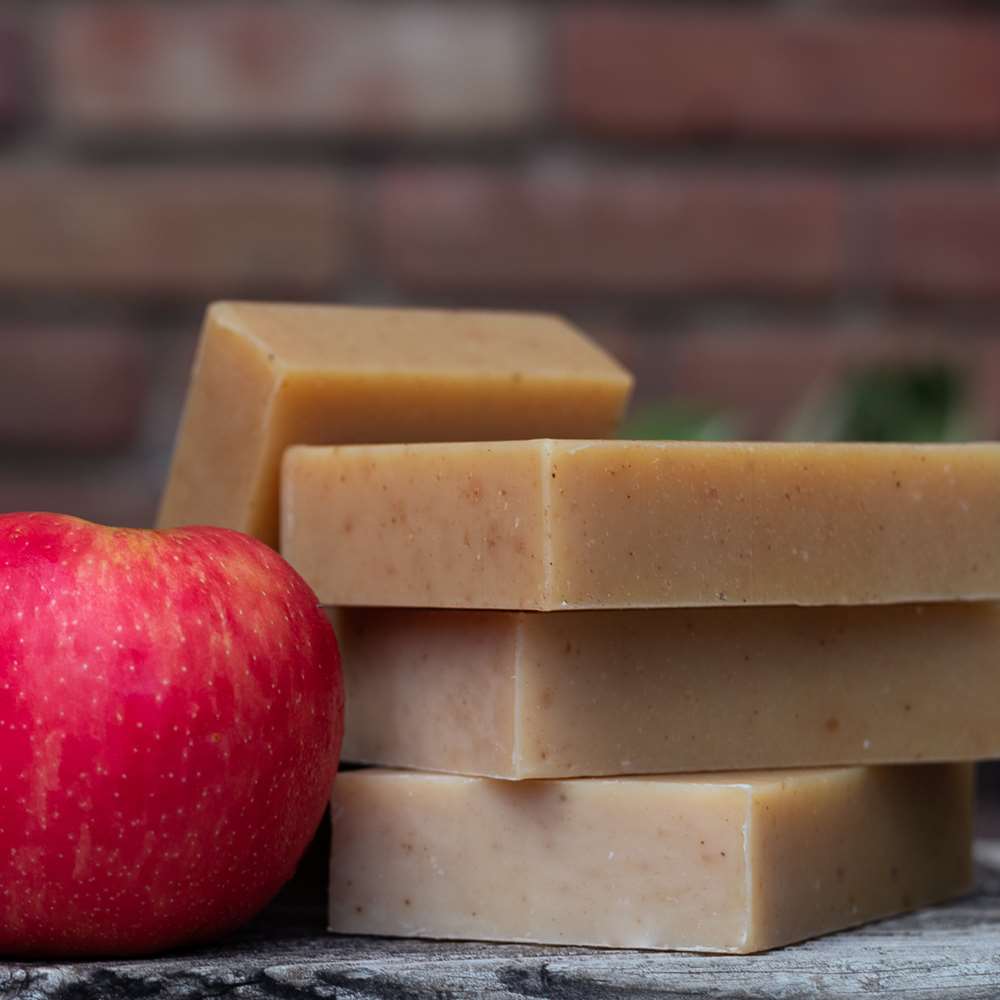
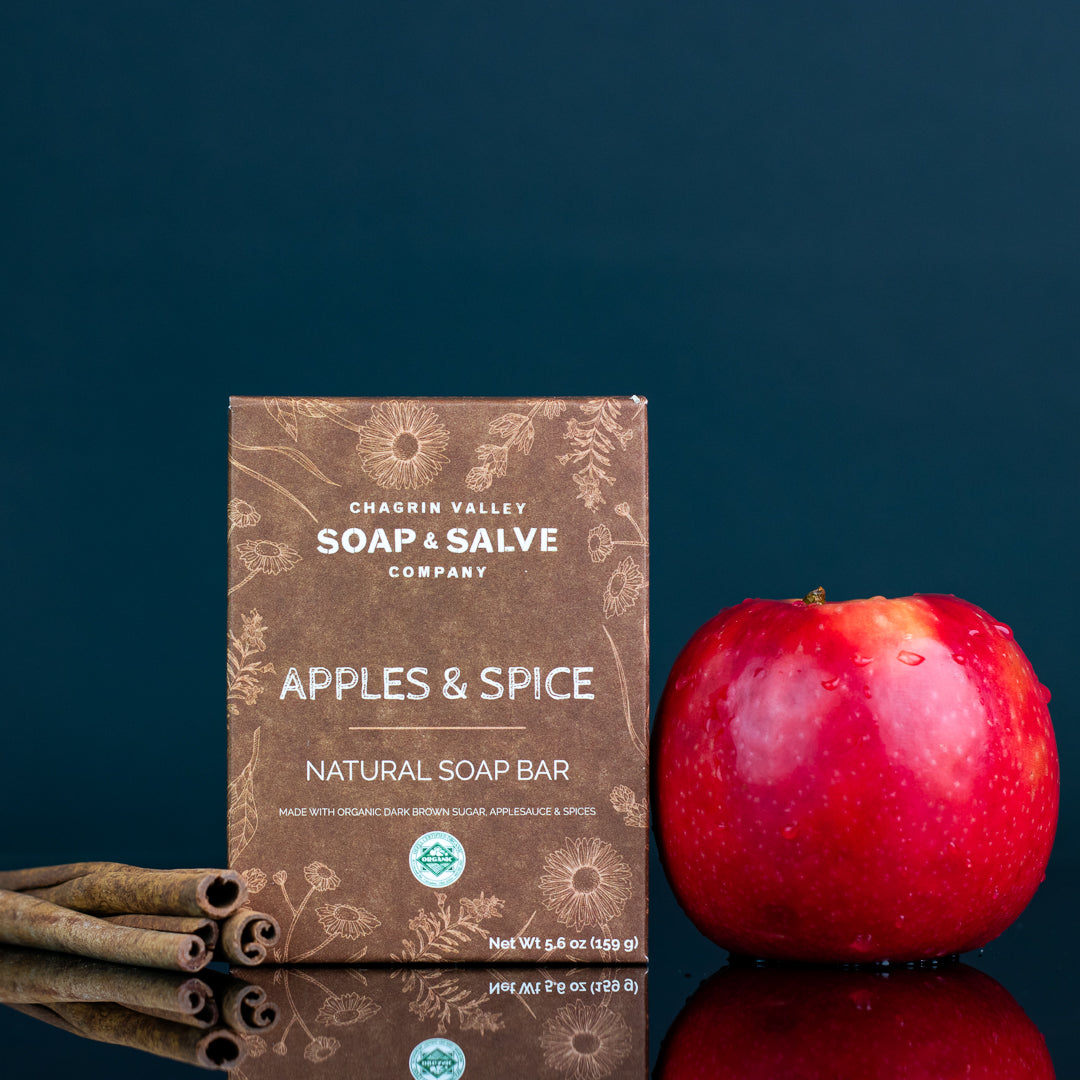
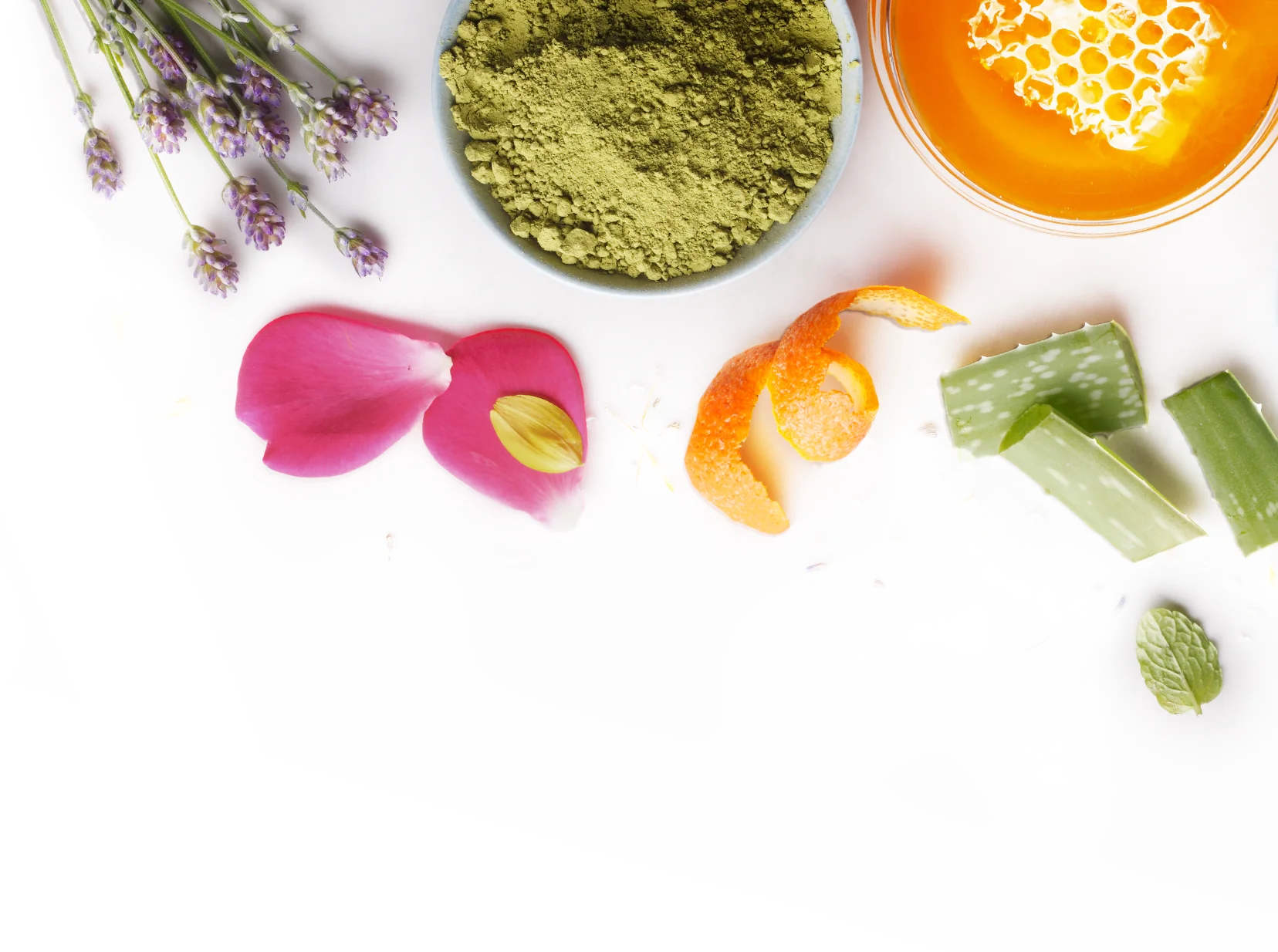
Effective, Feel Good Ingredients
The goal is simple: to Harness the Power & Simplicity of Nature® to cleanse, soothe, heal, and protect your skin and hair!
Our unique formulas rely on moisturizing oils and butters, healing botanicals, and pure essential oils. We choose every ingredient with one end-result in mind….the BEST possible natural skin care for YOU!
Featured Ingredients

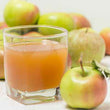
Organic Apple Juice
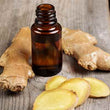
Organic Ginger Essential Oil
All Ingredients:
|
*Ingredient is Fair Trade Certified ^Used in the saponification process to turn oil into soap and glycerin. None remains in the finished product.
Made with certified organic Apple Juice, Apples & Spices
|
Frequently Asked Questions
Why Choose Chagrin Valley Natural Soaps
Aren't all handmade natural soaps the same? . . .
The answer is NO!
 Saying a soap is "handmade" says nothing about quality of the ingredients or the knowledge and skill of the soapmaker!
Saying a soap is "handmade" says nothing about quality of the ingredients or the knowledge and skill of the soapmaker!
Chagrin Valley is not just another soap and skincare company. We are committed to healthy skin, healthy people and a healthy planet.
We are a USDA Certified Organic Company specializing in luxurious, organic, handmade natural soaps and shampoo bars rich in natural glycerin for healthier skin and hair.
It's all about the ingredients! Inspired by our love of nature, we use organic herbs, seeds, flowers, vegetables, fragrant spices, fruits, pure essential oils and purifying clays for their exceptional skincare benefits and to provide natural color, aromatherapy, texture, or gentle exfoliation. Nothing artificial, nothing synthetic, no GMO’s, just natural wholesome ingredients.
Chagrin Valley's Natural Soap & Shampoo Bars Are...
- all natural
- made with USDA Certified Organic ingredients
- handcrafted in small batches using the old-fashioned Cold Process Method
- made with sustainable and fair trade ingredients
- certified cruelty-free
- free of detergents
- free of synthetic fragrances
- free of synthetic colors
- free of artificial preservatives
- free of artificial foam boosters
- free of alcohol and petroleum products
- free of synthetic additives
- free of GMOs
- biodegradable
- mild and nourishing
- rich in natural glycerin
- magnificent long-lasting lather
- cured for 8 to 10 weeks
Our soap making process uses only natural and organic ingredients. Why add artificial ingredients to a handmade product?

"Are All Handmade Soaps The Same?"
"12 Reasons to Use Natural Soap"
View Answer Page
Don't I need to use antibacterial soap to protect my family from germs?
The Short Answer
NO! Adding antibacterial chemicals to soap does not keep your family safe from germs.
I understand why folks (especially those with children) are choosing products labeled “Antibacterial,” hoping to keep their family safe in the war against germs.
According to Janet Woodcock, M.D., director of the FDA’s Center for Drug Evaluation and Research (CDER).
"Consumers may think antibacterial washes are more effective at preventing the spread of germs, but we have no scientific evidence that they are any better than plain soap and water.
In fact, some data suggests that antibacterial ingredients may do more harm than good over the long-term.”
Simply washing your hands with old-fashioned natural soap and water rids your skin of most fungi, bacteria, and viruses. Soap does not kill germs, it surrounds them and carries them away.
The Long Answer
Please read our blog: Antibacterials: More Harm Than Good!
View Answer Page
Do Your Natural Soap And Shampoo Bars Have An Expiration Date?
The Short Answer
Yes And No!
Although handmade natural soaps usually get better with age, we recommend using our soaps within 12 months of purchase. Our scented soaps should be used within 3 months after removing them from the box.
Although the soaps will not be "spoiled" after that time, you may notice some changes as natural soap ages.
- some natural colors may fade over time
- the scents from pure natural essential oil scents will fade over time
The changes in color and scent happen even more quickly in our sample size bars.
These small natural soap bars have a much greater surface area to volume ratio which allows essential oils to evaporate from the surface more quickly. However, the scent may still be there when you lather up.
I have found some ancient bars hiding in my closet that years old. The scents were gone, but the lather was incredible!
The Long Answer
For a more detailed discussion please read our blog, "The Shelf Life, Color & Scent of an All Natural Soap."
How You Can Help Prolong Shelf-Life
-
Natural soaps need to breathe. Exposure to air promotes hardening of your soap and contributes to longer-lasting quality. Soap should be left unwrapped in their boxes or wrapped with breathable materials. Tight wrappers cause humid conditions by preventing evaporation of moisture.
- Our soaps are packaged in breathable, recyclable, sustainable packaging! Keep your natural handmade soaps in a dry, cool place away from sunlight, excessive heat and humidity.
- Our scented soaps, like Lavender Rosemary, can be placed in a muslin bag, old clean sock, or wrapped in a piece of cloth and put in your linen closet or dresser drawer to give a delightful fragrance to your linens and clothes while waiting to be used.
View Answer Page
Why Does the Smell of Natural Soap and Shampoo Bars Made with Essential Oils Change?
My natural soap bar doesn't smell the same as the last one
We sometimes receive emails that go like this:
-
I just reordered [some soap]. It is my favorite bar but it does not smell the same. Did you change the recipe?
- This name of this bar is "lavender . . . " but I smell more of the other essential oils than lavender. Why do you call it lavender?
The good news is that when you purchase natural soap from an organic skincare company, it is scented with only pure essential oils.
The bad news is that when you purchase natural soap from an organic skincare company, it is scented with only pure essential oil.
The scent of an essential in any totally natural product can and will change over time and from batch to batch.
Essential Oils are a Natural Ingredient
Essential oils come from nature. The quality and scent of essential oils are affected by yearly weather conditions and varies from crop to crop and region to region.
This makes it very difficult to produce finished products in which the scents are always exactly the same.
Most commercial soaps (and skincare products), even some of the "natural" ones that contain some essential oils, are made with at least some synthetic fragrances oils, nature identical oil, or natural fragrance oil. Using any synthetic fragrance ensures a more consistent scent.
Essential oils are temperamental to work under any circumstance. But while a natural essential oil scent blend may change a bit in a cream or oil, these blends are especially unpredictable when making cold processed natural soap.
After all my years of soap making in never ceases to amaze me just how much the actual soap making process changes the scent of an essential oil blend.

Natural Soap and Essential Oils
Why We Use Only Real Plant Essential Oils?
Natural Fragrance Oil? . . . Really?
Why Are Synthetic Fragrance Oils So Popular?
View Answer Page
How Big are Chagrin Valley Natural Soap and Shampoo Bars?
 Although we get asked this question often, it is a very difficult one to answer, because the bottom line is . . . how old is the bar? Is It freshly cut or has it been allowed to cure?
Although we get asked this question often, it is a very difficult one to answer, because the bottom line is . . . how old is the bar? Is It freshly cut or has it been allowed to cure?
Handmade soap and shampoo bars made using the cold process method and at the end of the soap reaction (saponification), they still contain water. The curing process allows excess water to evaporate.
Our freshly cut full-size bars are soft and weigh approximately 6.0 to over 6.5 ounces.
These bars will lose approximately 12% of their weight as most of the water evaporates during the first 6 to 8 weeks of curing time. This means that an average fresh bar, at 6.5 ounces will weigh approximately 5.7 ounces after about 8 weeks.
At Chagrin Valley Soap, our soap and shampoo bars are cured for about 10 to 12 weeks before selling and moisture will continue to evaporate over time as the bar ages. So, as our soap and shampoo bars sit waiting for a new home they will continue to shrink in size.
Some soap makers use the fresh-cut weight on their packaging, but we feel that is an inaccurate description. We use the average weight of our bars after at least a 10 week curing time.
While some companies allow their soaps to cure for only 4-weeks, but we know that our longer, slower curing time ensures a milder, harder, longer-lasting bar, with a very rich lather.
Some soap companies shrink wrap their soap bars to help prevent continuous shrinkage due to evaporation. We have a few big problems with that idea. First of all, we know that we definitely do not need any more plastic added to our planet. Secondly, although we know there will continue to be a small weight (and scent) loss over time, we prefer that over sacrificing the quality of our soap.
Since each of our soap/shampoo recipes is different and the percent of liquid used varies, the amount of water that evaporates over time and the bar size will also vary.
The average weight of Chagrin Valley full-size natural soap and shampoo bars is about 5.2 to 5.6 ounces after 10 weeks of curing. The average full-bar dimensions in inches are approximately 3.75 x 3 x 1.
Our Mini Bars of Soap and Shampoo (Loofah Foot, Pet Bars & Camping) weigh approximately 3 to 3.6 ounces.
Our Natural Soap and Shampoo Trial Size Sample Bars weigh approximately 1.5 to 2 ounces.
Summary of the variation in weight
- Our soaps are a handmade product
- As our curing bars sit and wait for a new home, they will continue to lose water weight and shrink a bit
- Since all of our recipes are different, the amount and type of liquid used to make each recipe differ and the more liquid used in the recipe, the more they will shrink as they cure
- In Winter the dry heat will often cause bars to shrink a bit more
- No plastic wrapping
- The good news is that the older bars will last longer and lather even better
Compare our bar size! Most handmade soap companies sell full size bars that are about 3.5 to 4.5 ounces. Our customers have told us that they like the larger size bars.
When you compare the prices of other soaps, please compare SIZE and ingredients as well!
For a great explanation of the process involved in making soap please read our blog, "How We Make Soap"
View Answer Page
How Long Will A Bar of Natural Soap Last?
Short Answer
 How long a natural soap bar will last depends on:
How long a natural soap bar will last depends on:
- how many people are using it
- how often you bathe or shower
- how you use the bar
For one person showering every day, a well-drained bar should last for about one month.
Longer Answer
Natural soaps are normally softer than commercial soaps because they retain their natural glycerin (which is removed in commercial soap production) and contain no artificial hardening chemicals, synthetic waxes or free alkali.
We also superfat our soaps (add extra oils or butters) and use "softer" oils so that Chagrin Valley natural soaps are more emollient and leave skin feeling moisturized.
Different oils impart different qualities to soap. Some add lathering qualities, some moisturizing, some hardness, and so on. Compared to other natural bars, we use a larger percentage of extra moisturizing and conditioning oils in our soaps and shampoo bars. These oils produce a bar that may not be as hard as bars with less conditioning oils.
How you use the bar will also affect its lifespan. For example, do you use a washcloth, an exfoliating accessory, or only the bar? Although exfoliating loofahs and sponges are great they will use up the soap much faster than a washcloth or the "only the bar" purists.
Our Natural Soap Will Last A Long Time With Proper Care
- Don't let your soap sit in water
- Store soap on a well-drained soap dish
- Allow soap plenty of fresh air to dry between uses
- Never place soap where shower water can continuously hit it
- If your bar ever gets waterlogged and becomes gooey, simply set it on a draining soap dish or stand it on its edge for a few days and let it dry out thoroughly
Cute Story: A customer called to say she loved our soaps but could not buy them anymore because they did not last as long as other soaps. A week later she called to place an order and apologize. Her husband, who would NEVER use her natural soaps before, fell in love with her new Juniper soap . . . and he showered twice a day!
To maximize the life of your soap, keep it in a well-drained soap dish so it can dry between uses.
We sell a handcrafted solid white oak soap dish. The deep ridges are perfect for keeping your all natural handcrafted soap dry between uses. White Oak is the wood used in shipbuilding.
A tip passed on by one of our customers whose kids always leave the soap in a water puddle: cut the large bars in halves. Then alternate the halves, allowing a longer drying time between uses.
View Answer Page
Are Chagrin Valley Ingredients & Products USDA Certified Organic?
Chagrin Valley Soap & Salve is a USDA Certified Organic Company

The most important consideration in any business is its customers. Today's world of misleading claims, false advertising, and simple deception, often leaves consumers trying to discover the truth about personal products and their ingredients.
- We want our customers to know that we are committed to transparency in everything we do.
- We want our customers to know that when we say "organic," we mean it.
- We believe that in becoming a USDA Certified Organic company, our customers do not have to wonder if we really use certified organic ingredients or if our organic products are truly organic.
- So we choose to be a certified organic company and abide by the strict standards required for organic certification.
Some of my favorite products are made with ingredients that just do not exist as certified organic. Why? At this time there are no standards created for ingredients specifically used in the personal care product industry. Organic certification of personal care products is based on the organic food standards set by the National Organic Program of the USDA.
But since we are a certified organic company, we are required to submit documentation that even our "non-organic ingredients" were produced without the use of toxic pesticides, genetically modified organisms (GMOs), sewage sludge, or irradiation.

Why Did We Become a Certified Organic Company?
What Do All of the Organic Labels Mean?
View Answer Page
What Do The Different Organic Symbols Mean?
We use two different organic symbols on our website.
Each symbol has a unique definition!
Organic Labels
The "certified organic" labeling has been developed by the USDA and refers to organic claims and labeling on food and personal care products in the United States. The USDA has very strict guidelines for the percentage of organic ingredients necessary to receive organic certification. Other countries have their own certification procedures, requirements, and standards. Labeling criteria and allowable ingredients differ from those in the US.
 The USDA Organic Logo Label can be used on products that meet the standards of the first two tiers of the organic labeling system in which 95 - 100% of the ingredients are certified organic.
The USDA Organic Logo Label can be used on products that meet the standards of the first two tiers of the organic labeling system in which 95 - 100% of the ingredients are certified organic.
Most of our non-soap products fall into this category and display the USDA logo!
 The Certified Organic by OEFFA label is used in our company for two reasons . . .
The Certified Organic by OEFFA label is used in our company for two reasons . . .
Soaps and Shampoos: These products contain at least 8% of the sodium hydroxide due to the process of soapmaking. Our "organic" soap is about 87% to 92% organic, but the USDA standard states that a product must be made of 95-100% organic ingredients in order to bear the USDA Certified Organic seal shown above. We are also not allowed to use the words "organic soap" on the label.
Wildharvested Ingredients: When using any agricultural ingredient (any ingredient that has a biological origin) that is not certified organic the same labeling rules we use for soap apply.
The USDA rules for proper labeling state that the products may display the certifying agent's logo but not the USDA organic logo. Our USDA certifying agency is OEFFA (The Ohio Ecological Food and Farm Association). Their logo is displayed on our "organic" soaps and shampoos.
Why do some soap companies use the word "organic" on their labels--even though it is against the rules? Click Here to Read More about Rules for Organic Labeling of Soap!
Unofficial Labels
We sometimes use an unofficial symbol for products made with "natural" ingredients that do not meet the criteria for either label above. You may see this type of symbol on products, like the Dead Sea Black Clay, Bamboo Charcoal, and Loofah Pumice Foot Soaps and our Mud & Clay and Rosemary Mint Charcoal Shampoo Bars.
Organic certification is based on organic farming and agriculture standards. As a result, the list of allowable non-agricultural ingredients (like clay, salt, mud etc) is based on raw materials used in agriculture or food production. Unfortunately, ingredients like some Clays, Pumice, Dead Sea Mud and Bamboo Charcoal are not used in farming or food production and thus do not appear on the list.
Although it may seem long, this is really a very brief description. For more detailed information please read, "What Do All Of The Organic Labels Mean?"
View Answer Page
Biodegradable Soap? Are Chagrin Valley Natural Soaps and Shampoo Bars Biodegradable?
Yes!
Chagrin Valley Natural Soaps Are Made Using Natural & Organic Ingredients and Are Biodegradable!
What Does Biodegradable Mean?
By definition, biodegradable means capable of being broken down by the action of living things, like natural bacteria, into simple substances that are not harmful to the environment.
If You Are A Camper Or Backpacker, Please Read On...
 There are many soap makers out there with good intentions who are claiming that their biodegradable soap or shampoo is safe to use in rivers and streams.
There are many soap makers out there with good intentions who are claiming that their biodegradable soap or shampoo is safe to use in rivers and streams.
Bringing a natural biodegradable soap on your multi-day backpacking trip is a great way to keep yourself feeling refreshed. But, even biodegradable soap can eventually pollute lakes and streams if it is not used properly.
The bacteria that break down natural soap are present mostly in the soil.
That means that even with biodegradable ingredients, you want to use this soap bar away from freshwater sources like lakes, rivers, and streams.
So, please, do not bath, wash your face, or do your dishes, even with biodegradable soap, in any river, lake, or stream.
Some suggestions
- Use a bucket to bring your water to an area at least 200 feet away from all sources of fresh water.
- Lather up sparingly.
- Always dispose of the grey water into the soil (NOT the water source). It is also best not to pour the entire soap solution in one spot. So, you can:
- Sprinkle small amounts of grey water in a wide arc (imagine slinging the water out of your pot, as opposed to pouring it).
- Or dig a small hole (like a cathole) in which to pour the soapy water. The idea is to surround the soap with the organic soil compounds that not only helps speed up decomposition, but also helps prevent surface runoff when it rains.
Is Natural Soap Really Better for Camping?
Absolutely! Commercial soaps, body washes, shampoos, and dish soap contain synthetic ingredients. Many of these ingredients include artificial colors and scents, detergents, and chemical preservatives, such as parabens, phthalates, and petrochemicals. These chemicals do not break down quickly.
Traces of these chemicals will remain in nature for many, many years and can have a potential negative impact on plants and animals.
A biodegradable natural soap is made with natural, organic ingredients that break down efficiently when exposed to the bacteria found in the soil.
There’s no substitute for nature. Together we can protect it from impacts like overuse, trash, and harming endangered wildlife by following the principles of "Leave No Trace."
View Answer Page
